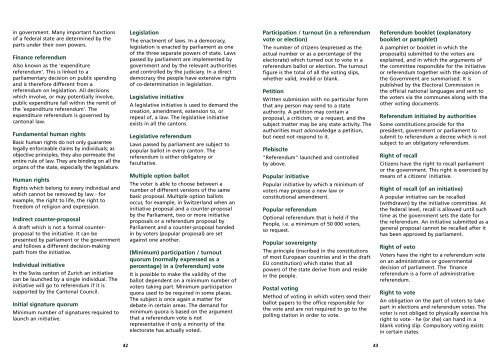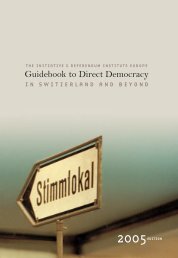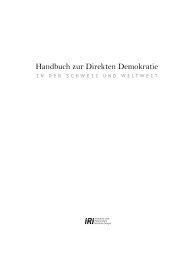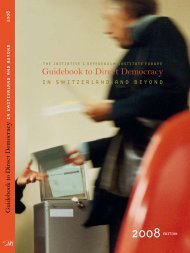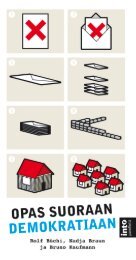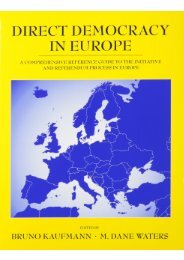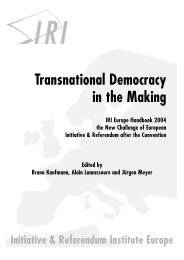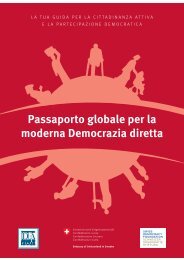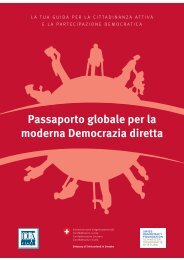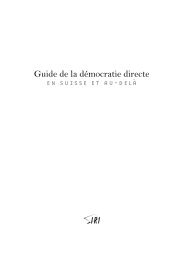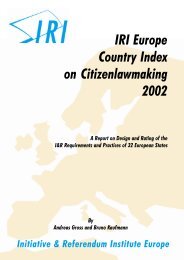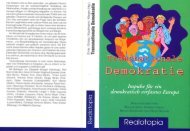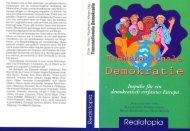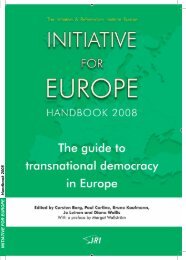Initiative & Referendum Monitor 2004/2005
The IRI Europe Toolkit for Free and Fair Referendums and Citizens’ Initiatives
The IRI Europe Toolkit for Free and Fair Referendums and Citizens’ Initiatives
Create successful ePaper yourself
Turn your PDF publications into a flip-book with our unique Google optimized e-Paper software.
in government. Many important functions<br />
of a federal state are determined by the<br />
parts under their own powers.<br />
Finance referendum<br />
Also known as the 'expenditure<br />
referendum'. This is linked to a<br />
parliamentary decision on public spending<br />
and is therefore different from a<br />
referendum on legislation. All decisions<br />
which involve, or may potentially involve,<br />
public expenditure fall within the remit of<br />
the 'expenditure referendum'. The<br />
expenditure referendum is governed by<br />
cantonal law.<br />
Fundamental human rights<br />
Basic human rights do not only guarantee<br />
legally enforceable claims by individuals; as<br />
objective principles, they also permeate the<br />
entire rule of law. They are binding on all the<br />
organs of the state, especially the legislature.<br />
Human rights<br />
Rights which belong to every individual and<br />
which cannot be removed by law - for<br />
example, the right to life, the right to<br />
freedom of religion and expression.<br />
Indirect counter-proposal<br />
A draft which is not a formal counterproposal<br />
to the initiative. It can be<br />
presented by parliament or the government<br />
and follows a different decision-making<br />
path from the initiative.<br />
Individual initiative<br />
In the Swiss canton of Zurich an initiative<br />
can be launched by a single individual. The<br />
initiative will go to referendum if it is<br />
supported by the Cantonal Council.<br />
Initial signature quorum<br />
Minimum number of signatures required to<br />
launch an initiative.<br />
Legislation<br />
The enactment of laws. In a democracy,<br />
legislation is enacted by parliament as one<br />
of the three separate powers of state. Laws<br />
passed by parliament are implemented by<br />
government and by the relevant authorities<br />
and controlled by the judiciary. In a direct<br />
democracy the people have extensive rights<br />
of co-determination in legislation.<br />
Legislative initiative<br />
A legislative initiative is used to demand the<br />
creation, amendment, extension to, or<br />
repeal of, a law. The legislative initiative<br />
exists in all the cantons.<br />
Legislative referendum<br />
Laws passed by parliament are subject to<br />
popular ballot in every canton. The<br />
referendum is either obligatory or<br />
facultative.<br />
Multiple option ballot<br />
The voter is able to choose between a<br />
number of different versions of the same<br />
basic proposal. Multiple option ballots<br />
occur, for example, in Switzerland when an<br />
initiative proposal and a counter-proposal<br />
by the Parliament, two or more initiative<br />
proposals or a referendum proposal by<br />
Parliament and a counter-proposal handed<br />
in by voters (popular proposal) are set<br />
against one another.<br />
(Minimum) participation / turnout<br />
quorum (normally expressed as a<br />
percentage) in a (referendum) vote<br />
It is possible to make the validity of the<br />
ballot dependent on a minimum number of<br />
voters taking part. Minimum participation<br />
quora used to be required in some places.<br />
The subject is once again a matter for<br />
debate in certain areas. The demand for<br />
minimum quora is based on the argument<br />
that a referendum vote is not<br />
representative if only a minority of the<br />
electorate has actually voted.<br />
Participation / turnout (in a referendum<br />
vote or election)<br />
The number of citizens (expressed as the<br />
actual number or as a percentage of the<br />
electorate) which turned out to vote in a<br />
referendum ballot or election. The turnout<br />
figure is the total of all the voting slips,<br />
whether valid, invalid or blank.<br />
Petition<br />
Written submission with no particular form<br />
that any person may send to a state<br />
authority. A petition may contain a<br />
proposal, a criticism, or a request, and the<br />
subject matter may be any state activity. The<br />
authorities must acknowledge a petition,<br />
but need not respond to it.<br />
Plebiscite<br />
"<strong>Referendum</strong>" launched and controlled<br />
by above.<br />
Popular initiative<br />
Popular initiative by which a minimum of<br />
voters may propose a new law or<br />
constitutional amendment.<br />
Popular referendum<br />
Optional referendum that is held if the<br />
People, i.e. a minimum of 50 000 voters,<br />
so request.<br />
Popular sovereignty<br />
The principle (inscribed in the constitutions<br />
of most European countries and in the draft<br />
EU constitution) which states that all<br />
powers of the state derive from and reside<br />
in the people.<br />
Postal voting<br />
Method of voting in which voters send their<br />
ballot papers to the office responsible for<br />
the vote and are not required to go to the<br />
polling station in order to vote.<br />
<strong>Referendum</strong> booklet (explanatory<br />
booklet or pamphlet)<br />
A pamphlet or booklet in which the<br />
proposal(s) submitted to the voters are<br />
explained, and in which the arguments of<br />
the committee responsible for the initiative<br />
or referendum together with the opinion of<br />
the Government are summarised. It is<br />
published by the Electoral Commission in<br />
the official national languages and sent to<br />
the voters via the communes along with the<br />
other voting documents.<br />
<strong>Referendum</strong> initiated by authorities<br />
Some constitutions provide for the<br />
president, government or parliament to<br />
submit to referendum a decree which is not<br />
subject to an obligatory referendum.<br />
Right of recall<br />
Citizens have the right to recall parliament<br />
or the government. This right is exercised by<br />
means of a citizens' initiative.<br />
Right of recall (of an initiative)<br />
A popular initiative can be recalled<br />
(withdrawn) by the initiative committee. At<br />
the federal level, recall is allowed until such<br />
time as the government sets the date for<br />
the referendum. An initiative submitted as a<br />
general proposal cannot be recalled after it<br />
has been approved by parliament.<br />
Right of veto<br />
Voters have the right to a referendum vote<br />
on an administrative or governmental<br />
decision of parliament. The finance<br />
referendum is a form of administrative<br />
referendum.<br />
Right to vote<br />
An obligation on the part of voters to take<br />
part in elections and referendum votes. The<br />
voter is not obliged to physically exercise his<br />
right to vote - he (or she) can hand in a<br />
blank voting slip. Compulsory voting exists<br />
in certain states.<br />
42<br />
43


